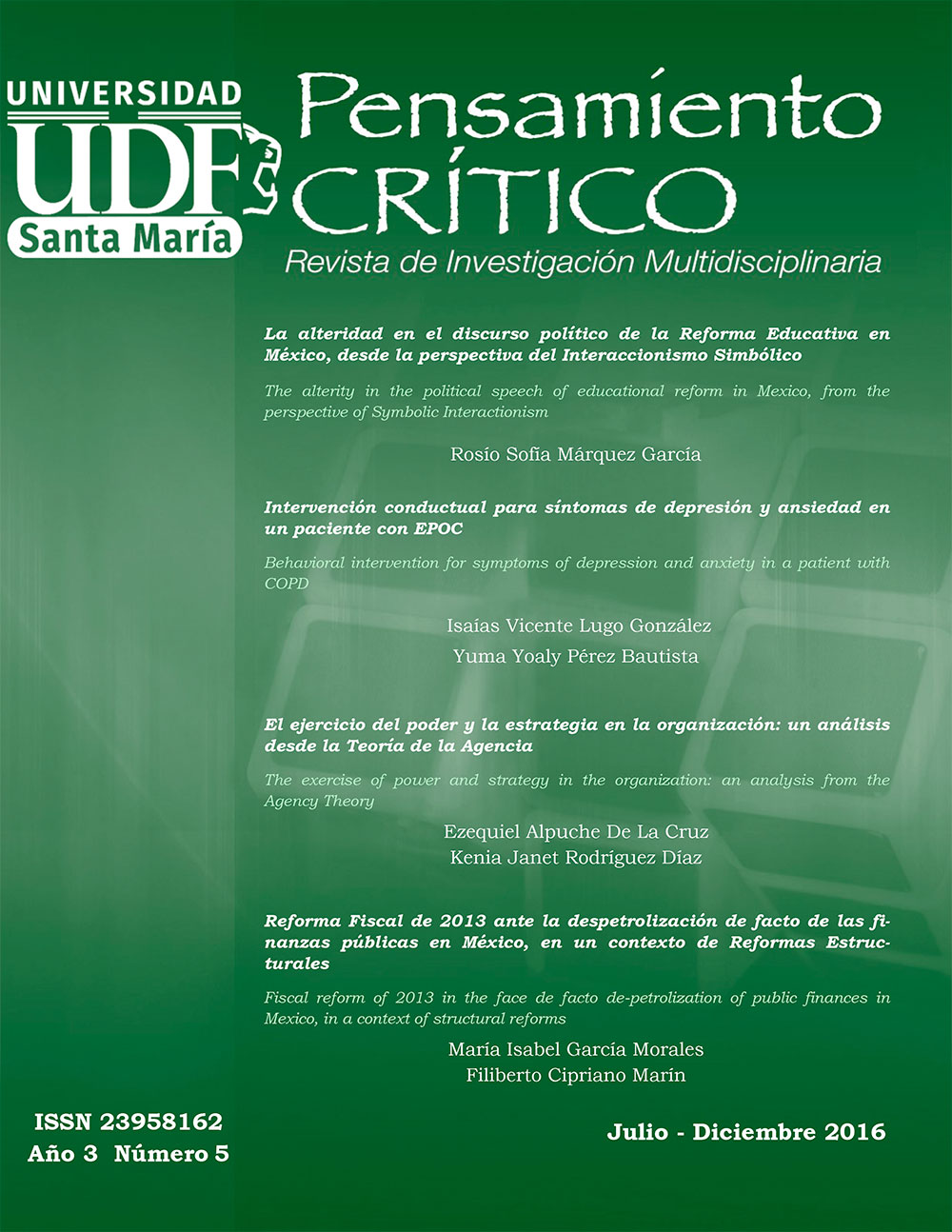Abstract
The aim of this paper is to analyze the relations between the exercise of power and the strategy in the organization. The theoretical corpus on which it relies is the New Institutional Economics - contracts, property rights and transaction costs - and Agency Theory. The type of study is descriptive, because it seeks to describe the main characteristics of a phenomenon and by the nature of the research the method is qualitative, because it analyzes behaviors and inter-subjectivities between actors and groups. The result of this work is that there are wide interrelations between the power of the CEO (agent) and the Board of Shareholders (principal) in terms of the exercise of power that the latter delegate to the former and the strategy by the strategic apex. The conclusions of the present research point towards a permanent negotiation between both spheres in the search for power as well as complementarities in order to achieve the superior objective of the organization.
References
Akerlof, G. & R. Shiller (2009). Animal Spirits. Cómo influye la psicología humana en la economía. Barcelona: Gestión 2000.
Ayala, J. (1999). Instituciones y Economía. Una introducción al neoinstitucionalismo económico. México: Fondo de Cultura Económica.
Barba, A. (1994). Conflicto Organizacional: estrategias corporativas y relaciones de poder. Estrategias Organizacionales, 11, 47-80.
Castaingts, J. (2000). Los sistemas comerciales y monetarios en la tríada excluyente. Un punto de vista latinoamericano. México: UAM-Iztapalapa & Plaza y Valdés.
Coase, R. (1937). The Nature of the Firm. Economica, 4, 16, 386-405.
Crozier, M. & E. Friedberg (1990). El actor y el sistema. Las restricciones de la acción colectiva. México: Alianza.
De Gaulejac, V. (2006). Management y comunicación: del poder disciplinario al poder managerial: el poder de la comunicación. En T. Páramo (coord.), Sociedad y comunicación. Una mirada al siglo XXI, pp. 405-424.. México: UAM-Iztapalapa / Plaza y Valdés.
Foucault, M. (2002). Vigilar y castigar: el nacimiento de la prisión. Buenos Aires: Siglo XXI.
Foucault, M. (2015). No hay más verdad que la que establece el poder. Madrid: RBA Gredos.
Hobbes, T. (2014). El Leviatán o el Estado. México: Fondo de Cultura Económica.
Jensen, M. y W. Meckling (1976). Theory of the Firm: Managerial Behavior, Agency Costs, and Ownership Structure. Journal of Financial Economics, 3, 4, 305-360.
Jensen, M. & K. J. Murphy (1990). CEO Incentives: It’s Not How Much You Pay, But How. Harvard Business Review, No. 3, Mayo-Junio.
Luhmann, N. (2005). Organización y decisión: autopoiesis, acción y entendimiento comunicativo. México: Anthropos / Universidad Iberoamericana.
Makridakis, S. (1993). Pronósticos. Estrategia y planificación para el siglo XXI. Madrid: Díaz de Santos.
March, J. & Olsen, J. (1997). El ejercicio del poder desde una perspectiva institucional. Gestión y Política Pública, 6 (5), 41-73.
Marx, C. (2014). El Capital: Crítica de la Economía Política. México: Fondo de Cultura Económica.
Mintzberg, H. (1988). La estructuración de las organizaciones. Barcelona: Ariel.
North, D. C. (1993). Instituciones, cambio institucional y desempeño económico. México: Fondo de Cultura Económica.
Ostrom, E. (2015). Comprender la diversidad institucional. México: Fondo de Cultura Económica.
Penrose, E. (1959). The Theory of Growth of the Firm. Oxford / Nueva York: Basil Blackwell / John Wiley & Sons.
Porter, M. (1987). Ventaja Competitiva: Creación y Sostenimiento de un Desempeño Superior. México: CECSA.
Pümpin, C. & García, S. (1993). Estrategia empresarial. Cómo implementar la estrategia en la empresa. Madrid: Díaz de Santos.
Robinson, W. (2013). Una teoría sobre el capitalismo global. Producción, clase y Estado en un mundo transnacional. México: Siglo XXI.
Simon, H. (1982). El Comportamiento Administrativo. Estudios de los procesos decisorios en la organización administrativa. Buenos Aires: Aguilar.
Smith, A. (1958). Investigación de la naturaleza y causas de la riqueza de las naciones. México: Fondo de Cultura Económica.
Turner, V. (1974). Dramas, fields and metaphors; symbolic action in human society. Ithaca, NY: Cornell University Press.
Weber, M. (1964). Economía y Sociedad. Esbozo de Sociología Comprensiva. México: Fondo de Cultura Económica.
Williamson, O. (1982). Mercados y Jerarquías: su análisis y sus implicaciones antitrust. México: Fondo de Cultura Económica.
Williamson, O. (1989). Las instituciones económicas del capitalismo. México: Fondo de Cultura Económica.

This work is licensed under a Creative Commons Attribution-NonCommercial-NoDerivatives 4.0 International License.
Copyright (c) 2025 Pensamiento Crítico. Revista de Investigación Multidisciplinaria

